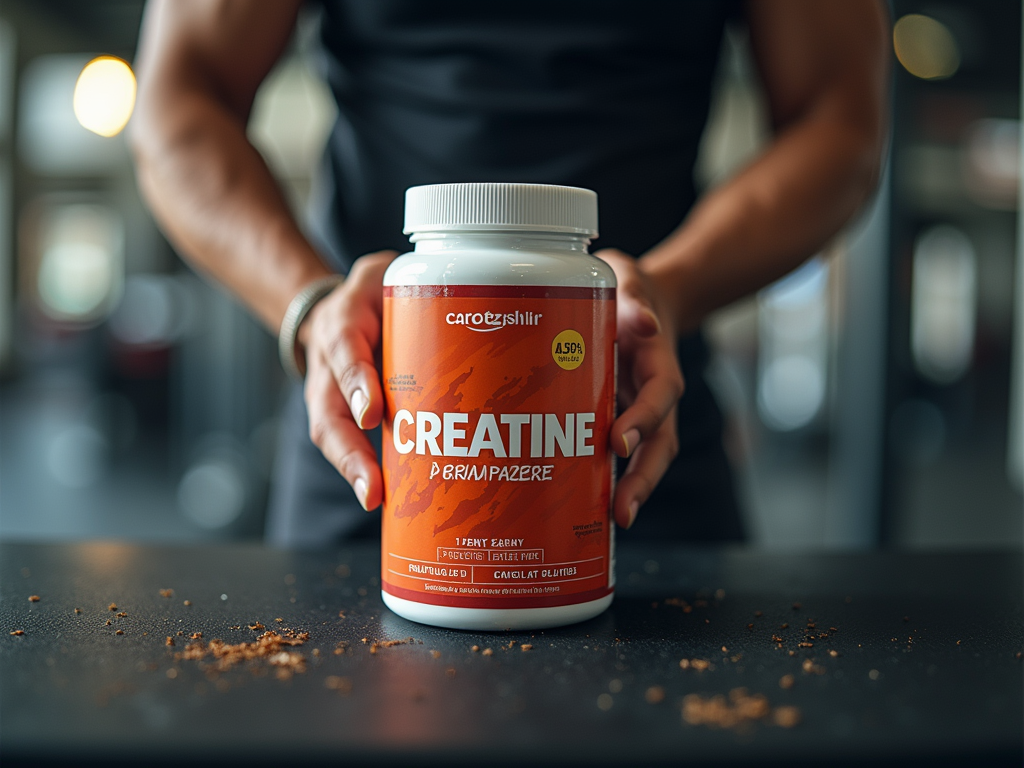Exploring Concussion Recovery: The Role of Creatine Supplementation
Hey there, active adults and busy parents! If you’re juggling workouts, parenting, or high-energy lifestyles, you know how vital it is to stay sharp—physically and mentally. Today, we’re diving into a surprising ally for brain health: creatine supplementation. Let’s unpack how this well-known fitness supplement might help with concussion recovery and cognitive resilience.
What Is Creatine and Why Does It Matter for Brain Health?
Creatine monohydrate isn’t just for gym enthusiasts. It’s a naturally occurring compound that fuels cellular energy production, particularly in tissues with high energy demands—like your muscles and brain[1][6]. Here’s the scoop:
Brain creatine levels drop after concussions, contributing to symptoms like brain fog and fatigue[3][6].
Dietary creatine (from meat/fish) provides ~1–2g daily, but supplementation can boost reserves by up to 40%[4][28].
The International Society of Sports Nutrition calls it one of the safest, most effective supplements for muscle and brain function[28][30].
The Science Behind Creatine and Concussion Recovery
How Concussions Impact Brain Energy
After a mild traumatic brain injury (mTBI), your brain faces an energy crisis:
Reduced blood flow and oxygen[3][12].
Increased demand for ATP (cellular energy)[6][14].
Mitochondrial dysfunction and oxidative stress[3][14].
Creatine steps in as a neuroprotective buffer:
Replenishes ATP stores rapidly[16].
Reduces oxidative damage and inflammation[9][14].
Animal studies show 50% less brain damage with pre-injury creatine supplementation[6][31].
Key Benefits of Creatine Supplementation for Brain Function
Research highlights creatine’s potential to:
Improve cognitive performance (memory, attention, processing speed)[2][15][25].
Reduce post-concussion symptoms like headaches, dizziness, and fatigue[6][11].
Support long-term brain health in high-risk groups (athletes, military personnel)[18][25].
A 2024 meta-analysis of 16 studies found:
31% improvement in memory tasks[2].
Faster attention and information processing[2][13].
Enhanced recovery in children with brain injuries[11][37].
Safety and Efficacy of Creatine Supplementation
Worried about side effects? Let’s bust myths:
Safe long-term: Studies confirm safety at 3–5g/day for up to 5 years[4][24][28].
No adverse effects on kidney/liver function in healthy adults[24][26].
Vegetarians/vegans may benefit most from lower dietary intake[22].
Who should avoid it?
Those with pre-existing kidney conditions[24][39].
Always consult a doctor if pregnant, breastfeeding, or managing chronic illness[24].
How to Use Creatine for Brain Health
Dosage Guidelines
Loading phase: 20g/day (split into 4 doses) for 5–7 days[23][28].
Maintenance: 3–5g daily[23][28].
Pair with carbs/proteins for better absorption[28].
Pro Tips for Active Lifestyles
Combine with omega-3s and magnesium for synergistic brain support[3][18].
Ideal for athletes in contact sports (football, hockey)[3][18].
Consider pre-season supplementation for neuroprotection[18][41].
FAQs: Your Creatine Questions Answered
1. Can creatine prevent concussions?
While it can’t prevent impacts, optimising brain energy reserves may reduce injury severity and speed recovery [6][18].
2. Is creatine safe for teens?
Limited data exists, but short-term studies show no adverse effects in adolescents[4][38]. Always consult a paediatrician first.
3. How long until I see cognitive benefits?
Brain creatine levels rise within 1–2 weeks, but symptom relief may take 4–6 weeks[2][6].
4. Can I mix creatine with other supplements?
Yes! It pairs well with omega-3s, magnesium, and caffeine-free nootropics[3][18].
Conclusion: A Smart Tool for Brain Resilience
Creatine monohydrate isn’t just a muscle-builder—it’s a brain ally for concussion recovery and cognitive sharpness. While more human trials are needed, current evidence suggests it’s a low-risk, high-reward addition to your wellness toolkit[6][25][28]. Whether you’re a weekend warrior, busy parent, or a fitness pro, consider chatting with your healthcare provider about how creatine could support your brain health journey.
Citations: [1] https://consensus.app/questions/creatine-help-concussion-recovery/ [2] https://www.frontiersin.org/journals/nutrition/articles/10.3389/fnut.2024.1424972/full [3] https://training-conditioning.com/cscca/creatine-concussions/ [4] https://www.frontiersin.org/journals/nutrition/articles/10.3389/fnut.2018.00115/full [5] https://pubmed.ncbi.nlm.nih.gov/37475743/ [6] https://www.mysportscience.com/post/creatine-cognition-and-concussion [7] https://pubmed.ncbi.nlm.nih.gov/33578876/ [8] https://www.frontiersin.org/journals/neurology/articles/10.3389/fneur.2023.1209548/full [9] https://ctv.veeva.com/study/the-effect-of-creatine-monohydrate-on-persistent-post-concussive-symptoms [10] https://pmc.ncbi.nlm.nih.gov/articles/PMC6094347/ [11] https://www.gssiweb.org/sports-science-exchange/article/creatine-supplementation-new-insights-and-perspectives-on-bone-and-brain-health [12] https://static.wixstatic.com/media/a04440_17790e00ccd94d9cb8c9c1ec0e5e11c3~mv2.gif?sa=X&ved=2ahUKEwjStpWXx6OLAxX5g5UCHah4CZYQ_B16BAgDEAI [13] https://www.nature.com/articles/s41598-024-54249-9 [14] https://www.ncbi.nlm.nih.gov/books/NBK209321/ [15] https://academic.oup.com/nutritionreviews/article/81/4/416/6671817 [16] https://completeconcussions.com/concussion-tips-information/creatine-and-concussion-recovery/ [17] https://www.gov.uk/government/publications/uknhcc-scientific-opinion-creatine-supplementation-and-improved-cognitive-function/uknhcc-scientific-opinion-creatine-supplementation-and-improved-cognitive-function [18] https://www.gssiweb.org/sports-science-exchange/article/prevention-of-head-trauma-is-there-a-role-for-nutritional-supplementation [19] https://www.psychologytoday.com/gb/blog/the-modern-brain/202311/should-you-take-creatine-to-boost-your-brain [20] https://www.youtube.com/watch?v=cqUBgPMtLSQ [21] https://www.worksafebc.com/en/resources/health-care-providers/guides/creatine-supplementation-for-treating-concussions?lang=en [22] https://pubmed.ncbi.nlm.nih.gov/31012130/ [23] https://www.gssiweb.org/images/default-source/article-images/sse186-table1.jpg?sfvrsn=2&sa=X&ved=2ahUKEwjy4OSnyaOLAxXGPrkGHfQrNi8Q_B16BAgFEAI [24] https://my.clevelandclinic.org/health/treatments/17674-creatine [25] https://www.nature.com/research-intelligence/creatine-supplementation-in-health-and-performance [26] https://www.mayoclinic.org/drugs-supplements-creatine/art-20347591 [27] https://www.healthline.com/nutrition/10-benefits-of-creatine [28] https://www.gssiweb.org/sports-science-exchange/article/the-safety-and-efficacy-of-creatine-monohydrate-supplementation-what-we-have-learned-from-the-past-25-years-of-research [29] https://www.essex.ac.uk/blog/posts/2023/01/19/creatine-supplements-what-the-research-says-about-how-they-can-help-you-get-in-shape [30] https://www.tandfonline.com/doi/abs/10.1186/s12970-017-0173-z [31] https://static.wixstatic.com/media/a04440_17790e00ccd94d9cb8c9c1ec0e5e11c3~mv2.gif?sa=X&ved=2ahUKEwiQ76SpyaOLAxVSr1YBHRciC00Q_B16BAgAEAI [32] https://www.researchgate.net/publication/372133410_Pilot_study_protocol_of_a_randomized_controlled_trial_for_the_potential_effects_of_creatine_monohydrate_on_persistent_post-concussive_symptoms [33] https://www.semanticscholar.org/paper/Pilot-study-protocol-of-a-randomized-controlled-for-B%C3%B8dker-Marcussen/69772ef4d2303c10908ad82c690db627d7412e0b [34] https://openresearch.surrey.ac.uk/esploro/outputs/conferencePresentation/Creatine-supplementation-for-symptom-alleviation-after/99514087802346 [35] https://scholarlyexchange.childrensmercy.org/cgi/viewcontent.cgi?article=1052&context=clinical-critically-appraised-topics [36] https://pmc.ncbi.nlm.nih.gov/articles/PMC6093191/ [37] https://pmc.ncbi.nlm.nih.gov/articles/PMC8912287/ [38] https://pubmed.ncbi.nlm.nih.gov/18652082/ [39] https://www.health.harvard.edu/exercise-and-fitness/what-is-creatine-potential-benefits-and-risks-of-this-popular-supplement [40] https://portal.findresearcher.sdu.dk/en/publications/pilot-study-protocol-of-a-randomized-controlled-trial-for-the-pot [41] https://pmc.ncbi.nlm.nih.gov/articles/PMC6094347/

